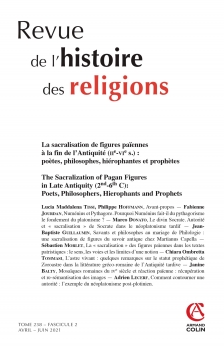
REVUE DE L'HISTOIRE DES RELIGIONS (2/2021)
Pour acheter ce numéro, contactez-nous
Recevez les numéros de l'année en cours et accédez à l'intégralité des articles en ligne.
Après un aperçu général sur la réception de Zoroastre, le prophète et fondateur de la religion persane (qui était considéré comme un sorcier et comme un sage), dans la culture gréco-latine, l’article présente une discussion sur deux passages moins connus (Arnobe et le roman pseudo-Clémentin), où les aspects traditionnels du sorcier et de l’astrologue se mêlent à des interprétations qui relèvent du gnosticisme et présentent aussi des contaminations avec la Bible.
After providing a general introduction on how Greco-Roman sources treated the figure of Zarathushtra, the prophet and founder of the Persian religion, who was considered both as a sorcerer and as a sage, this paper investigates two less known passages dealing with different interpretations of Zarathushtra. Arnobius and the author of the Pseudo-Clementines emphasise his role as a magician and attest to some implied links with Gnostic literature and doctrines, also by means of some connections with Biblical figures.

